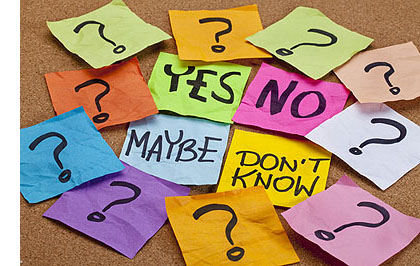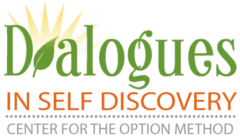 One of the stumbling blocks to making a decision for many people is knowing the right thing to do. If I pick Door #1, will it turn out okay for me? Will it be better than Door #2? They struggle with trying to figure out what the best thing to do is. When it comes to making decisions, we can all profit by doing the research necessary to figure these things out. Whether it’s a trusted friend, colleague, doctor or the all-important and ever-expanding Mr. Google, information gathering can help us tremendously. But do you ever find yourself cycling through more and more questions and research, delaying that moment when you make the final choice? Cringing at the what if’s? and imagined regrets? When you are fearful of the outcome, it isn’t the best time to make a decision. So instead of pushing yourself into something that you can’t feel comfortable with, why not take some time to do some clearing? Here’s some examples:
One of the stumbling blocks to making a decision for many people is knowing the right thing to do. If I pick Door #1, will it turn out okay for me? Will it be better than Door #2? They struggle with trying to figure out what the best thing to do is. When it comes to making decisions, we can all profit by doing the research necessary to figure these things out. Whether it’s a trusted friend, colleague, doctor or the all-important and ever-expanding Mr. Google, information gathering can help us tremendously. But do you ever find yourself cycling through more and more questions and research, delaying that moment when you make the final choice? Cringing at the what if’s? and imagined regrets? When you are fearful of the outcome, it isn’t the best time to make a decision. So instead of pushing yourself into something that you can’t feel comfortable with, why not take some time to do some clearing? Here’s some examples:
Realize at the end of the day, whatever you learn to help you make a decision, it’s your own beliefs that settle the question for you. Several years ago I was a smoker. I was a very light smoker, but at some point it started to concern me that I was still smoking. I thought I should quit but never seemed to do it. Then one day, I decided to really examine my thinking about it. I realized that the Surgeon General’s proclamation wasn’t scaring me. I wasn’t convinced that smoking was bad for me. Looking back on that, it’s hard to believe I didn’t buy off on that, but that is where I was at. I knew that statistics weren’t going to do it for me. So I looked at my beliefs. What did I believe about smoking? Not what others say. Not what I read. Not even people I knew with cancer. What did I believe? I put the pack of cigarettes down in front of me and reminded myself first, that I would never do anything that I believed was bad for me. Then I made a deal, “Wendy, if you believe that smoking is okay for you, go ahead and light one up right now. But if you believe that smoking is bad for your health, don’t ever smoke again. Notice the emphasis on myself. It’s not about whether smoking is good or bad for others, but for me. What did I believe? The answer was easy. I believed smoking was bad for me. I picked up the pack and crushed it to smithereens. That was ten years ago and I haven’t smoked since. Whenever I get the urge, which happens about once a year, I remind myself what I believe and that’s the end of it.
Accept where you are at. In 2004, after many months of pain and physical deterioration, I was diagnosed with a tumor in my cervical spine. Luckily for me, a surgical solution was available and I was advised to make the decision quickly because my life was at risk. I was tremendously relieved that surgery was an option, but I was also being treated by a homeopathic practitioner, who begged me not to have the surgery. She was so certain that homeopathy would cure the tumor. I wanted to believe her and I was torn. I had never had such a serious and risky surgery. Wouldn’t it be wonderful if by drinking the homeopathic remedy, I could be cured? I seesawed back and forth about what to do. Ultimately I opted for the surgery realizing that even though homeopathy might work, I wasn’t in the mindset at the time where I could put my eggs in that basket. And I didn’t want my family to worry about my prognosis if I didn’t have the surgery. So I happily put myself in the surgeon’s hands. He saved my life.
Understand the purpose of your fears and then be done with them. It doesn’t matter if everyone gets fearful about making important decisions. If you do, your reasons are the only ones that matter. When we are fearful, it may seem that we have to be that way, but that is an illusion. Our fears always have a purpose – usually to protect us in some way. If you can find out how your fear is protecting you, it opens up new possibilities. Wouldn’t you rather just protect yourself in the way you would love, rather than suffer with debilitating fear? The Option Method is the perfect vehicle to excavate your fears in a quick, effective way. For more information about how The Option Method can help you make decisions, call Wendy Dolber at 973-714-2800.
